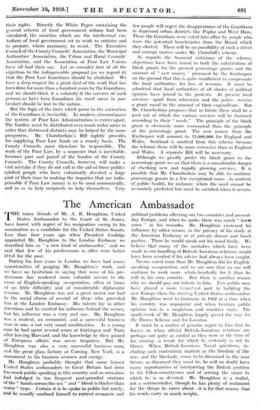The American Ambassador
THE many friends of Mr. A. B. Houghton; United States Ambassador to the Court of St. James, have learnt with regret of his resignation owing to his nomination as a candidate for the United States Senate. Less than four years ago when President Coolidge appointed • Mr. Houghton to the London Embassy we -described him as "a new kind of ambassador," and we said that few of his predecessors in office were better fitted for the post. • • , During his four years in London we have had many opportunities of gauging Mr. Houghton's work, and we have. no :hesitation in saying that none of his pre- decessors has rendered. more . valuable service to the cause of English-speaking co-operation, often at times of no little difficulty and of considerable diplomatic tension.. Mr. Houghton was not a great orator nor had he the social charm .of several of those who preceded him at the London Embassy.. His. talents lay in other directions and he exerted his influence behind the scenes, but his influence was a:very real one. Mr. Houghton was a student, an ecenomist, and a successful business man •iworie, a not very usual combination. As a young man he had -spent several years at Gottingen and Paris after leaving Harvard, and the knowledge -he then gained of European affairs was never . forgotten. But Mr. Houghton was also a very . successful business man, and the -great glass -factory at Corning, New York, is a monument to his business acumen and. energy.
Mr. Houghton .probably • thought that some former United States ambassadors to Great Britain had done too.- much public speaking in this country and on occasions had indulged in too frequent postprandial orations of the ' hands-aeross-the-sea " and "blood is thicker- than water 'type. Certain- it is he spoke in public but rarely, and he usually -confined himself to current economic and political problems affecting our two countries and present- day Europe, and when he spoke there was much " horse sense" in his remarks. Mr. Houghton exercised his influence by other means, in the privacy of his study at the American Embassy or at private dinner and lunch parties. There he would speak out his mind freely. We believe that many of the mistakes which have been made in our handling of British-American relations would have been avoided if his advice had always been sought.
No one cared more than Mr. Houghton did for English- speaking co-operation, and we are sure that 110 one will continue to work more whole-heartedly for it than he will in his own country. But there is another reason why we should pay our tribute to him. Few public men have played a more in-.,ra-el-tant part in building the new Europe than the retiring United States ambassador- Mr. Houghton went to ,Germany in 1922 at -a time when his country was unpopular and when German public Opinion was in a suspicious and sensitive state. The spade-work of Mr. .Houghton largely paved the way for the Dawes Scheme and for Locarno. • . It must be a matter of genuine regret to him that he leaves us when official British-American relations are perhaps not quite as cordial as they *ere at the time of . his coming—a result for which he certainly is not to bionic. When British-American Naval questions, in- • eluding such contentious matters as the freedom of the _ seas and the blockade, come to be discussed in the near - future, as discussed they must be, he will no doubt have many opportunities of interpreting the British position to his fellow-countrymen- and of serving the cause to . which he- is so devoted.. Mr. Houghton is a realist, . not a- sentimentalist, -though .he has plenty of_ sentiment for the things he cares about—it is for that reason that - his words carry so much weight. -












































 Previous page
Previous page